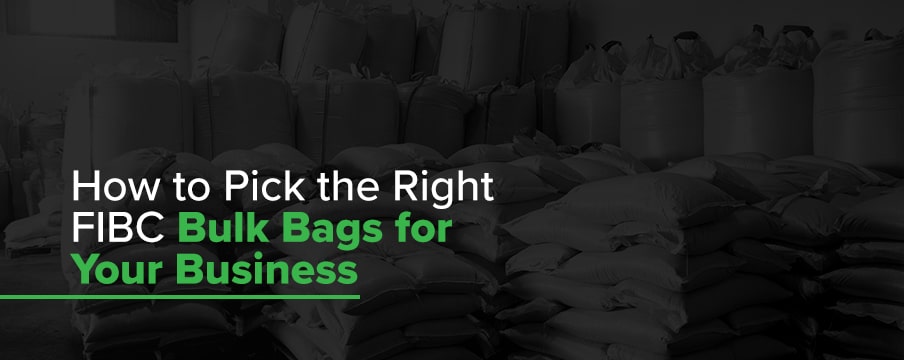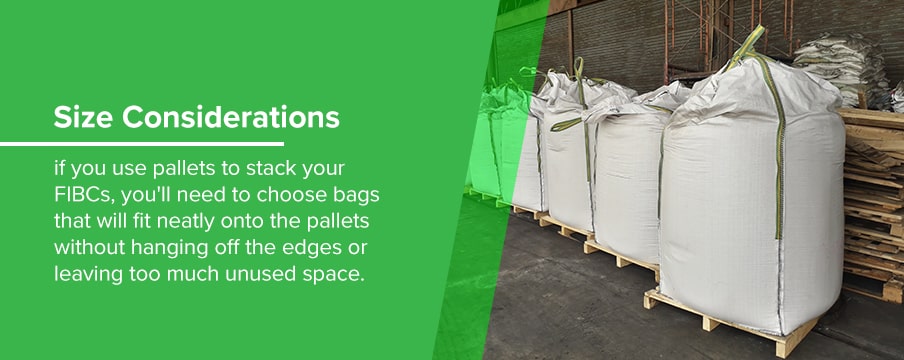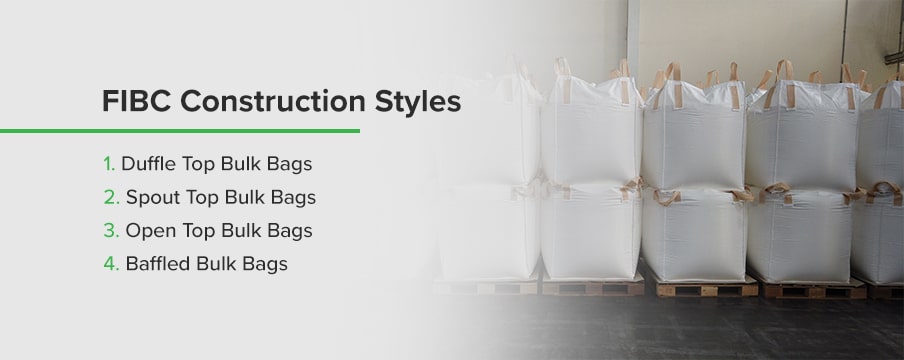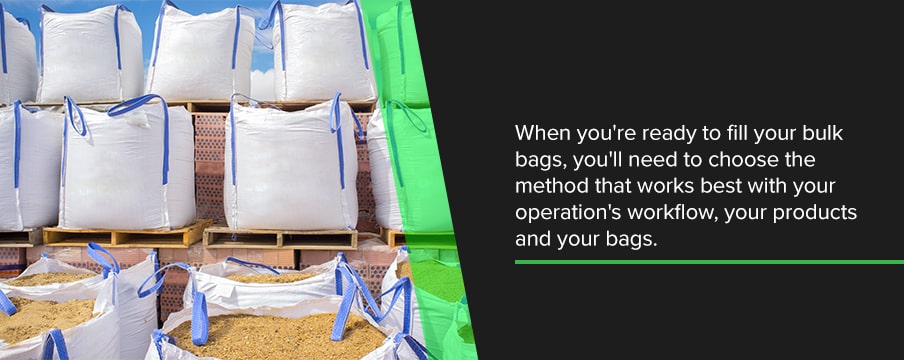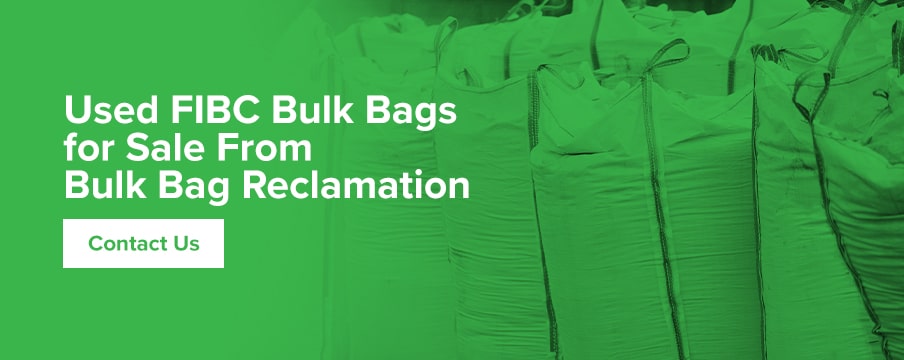How to Pick the Right FIBC Bulk Bags for Your Business
When you’re looking for FIBC bulk bags for sale, you need a way to ensure you get the right ones for your business. Each type of flexible intermediate bulk container (FIBC) has advantages for different applications, especially in industries like agriculture, chemical manufacturing, construction, and food and beverage production. You’ll need to keep your products and your storage and transport methods in mind as you select FIBCs.
For example, in 2020, U.S. agriculture produced 14.2 billion bushels of corn and 4.14 billion bushels of soybeans. Those products and many others like seeds, grains, potatoes and tobacco often need to travel across the country or become exports shipped worldwide. Quality, well-chosen FIBCs make that process convenient and economical. Construction companies also need to transport a tremendous variety of products, including sand, gravel, timber, glass, shingles, asphalt chunks and concrete. Well-chosen FIBCs give you the versatility you need to handle these materials with ease and confidence.
Bulk Bag Reclamation is here to help with your decision. We are happy to consult with you and can offer expert guidance as you choose the right FIBC bulk bags for your operations. We’ve developed this guide to help you learn more about different bulk bags and determine which ones might best suit your needs.
Size Considerations
You’ll need to choose FIBCs that fit your products’ dimensions and weight, as well as the methods you will use to handle the bags. For instance, if you use pallets to stack your FIBCs, you’ll need to choose bags that will fit neatly onto the pallets without hanging off the edges or leaving too much unused space.
If you know you’ll be shipping heavy products, you’ll also need to select bags that can accommodate extreme weights without breaking. Correctly sizing your bags helps you minimize product waste, maximize your profits and avoid injuries that could occur if an improperly sized, overstuffed bag ruptured near an employee.
As you size the right bulk bags for your operations, you’ll need to take a couple of critical factors into consideration:
- The density of your product in pounds per cubic foot
- The height and width of your existing pallets
Having these figures ensures you’ll get bags that will fit correctly on your pallets. Imagine you have a farm that produces grain products weighing about 50 pounds per cubic foot. Say your operation needs to ship 2,500 pounds of that grain using bulk bags. Dividing 2,500 pounds by 50 pounds per cubic foot lets you know you’ll need to purchase FIBCs with a carrying capacity of 50 cubic feet.
Once you know that FIBC bulk bag specification, you can work with your professional bulk bag supplier. They can help you figure out what dimensions will give you the required capacity while fitting safely and neatly on your pallets, saving you valuable space.
Types of FIBC Bulk Bags
At Bulk Bag Reclamation, we offer various types of bulk bags to meet your storage, transportation and safety needs. Our bags vary in the materials they contain and the purposes they are best suited for.
Material Types
The standard categorizing system for FIBCs uses letters of the alphabet to indicate the bags’ physical properties and their protection against sparks and electrostatic shocks. These properties are critical because they keep employees safe from electric shocks and minimize the risk of fires and explosions. The categories include:
- Type A: Type A bulk bags are standard bulk bags usually made from woven polypropylene, calcium carbonate and a UV additive for outdoor protection. These bags are sturdy, flexible, reliable and cost-effective, though they cannot store combustible products.
- Type B: Type B bulk bags also contain woven polypropylene and are very similar to type A bulk bags. However, they have an additional thin coating to protect against sparks.
- Type C: Type C bulk bags typically contain carbon filaments that offer protection for flammable powders, though they lack antistatic protection. For safety reasons, these bags require grounding when employees are moving or filling them.
- Type D: Type D bulk bags contain antistatic materials. They are suitable for use with flammable powders, and they protect against electrostatic shocks without requiring grounding.
These distinctions are crucial in industries like chemical manufacturing. Chemical manufacturers frequently use bulk bags to ship chemical goods, especially hazardous products or those that can generate electrostatic charges. They need bulk bags that have the proper construction for containing hazardous products safely or dissipating electrostatic charges to protect employees from on-the-job injuries.
FIBC Construction Styles
FIBC bulk bags come in a few different construction styles, so you can choose the bags that work best with your unique filling, storage and transportation requirements. At Bulk Bag Reclamation, we offer these useful options in our inventory:
1. Duffle Top Bulk Bags
Our duffle top bulk bags contain closable fabric tops. This fabric is generally the same size and width as the panels that make up the bag’s sides. It can wrap around your facility’s overhead filling spout during filling to prevent materials like seeds or grain from spilling.
Duffle top bags offer appealing flexibility. You can wrap the fabric in different ways to provide speed and security options during filling, and you can fully open or shut the bag as needed. Because of the duffle top feature, these bulk bags are excellent for reducing product loss during storage and shipping.
2. Spout Top Bulk Bags
Our spout top bulk bags have more rigid spouts sewn into the top of each FIBC. These spouts offer excellent stability during filling, and they are often the best solutions for use with certain types of fixed machinery, especially equipment with a discharge hose.
Like duffle top bags, spout top bags are great for minimizing messes and reducing product loss during storage and shipping. Like all our refurbished bulk bags, they offer excellent value and durability and help you make your processes easier on the environment.
3. Open Top Bulk Bags
Our open top bulk bags are standard cube-shaped bags with an open upper area that provides ample space for easy manual product loading. These bags are beneficial for irregularly shaped objects — if you need to ship large timbers or other construction materials that don’t quite fit the bag, for instance, they can easily stick out at the top.
These bags also allow for maximum airflow, so they are ideal for perishable agricultural products like potatoes and onions that require breathability throughout transport and storage. Some of our open top bags come with ventilated strips for additional breathability.
4. Baffled Bulk Bags
Baffled bulk bags have stiff panels sewn into each of their sides. These panels enable the bags to hold a consistent, sturdy square shape with minimal bulge.
Because these bags cannot change shape easily, they often hold less volume than comparable open top, duffle top or spout top bags. However, they offer excellent advantages in stacking bags and maximizing storage space. Facilities can pack the bags tightly against one another to optimize storage and transport efficiency.
Filling Your Bulk Bags
When you’re ready to fill your bulk bags, you’ll need to choose the method that works best with your operation’s workflow, your products and your bags. For instance, you might optimize your filling protocols for the types of fill spouts you have or the transportation method your bags will undergo. You’ll also need to adhere to best safety practices to keep your employees safe on the job.
Below are a few essential considerations to keep in mind as you fill your refurbished FIBCs:
- Fill and empty bags evenly: You’ll need to practice even filling and discharging to keep your bulk bags securely upright. Remember to fill your bags from the center. If you fill them from one side, they could topple over, spill their contents and injure nearby employees.
- Secure the bottom: If your FIBCs have bottom discharge spouts, make sure those spouts are securely closed before you fill your bags. Forgetting this step could cause huge spills. Closing the spouts allows your operations to keep running smoothly and ensures that none of your products will go to waste.
- Use every loop: Many FIBCs come with four loops for maximum security and ease of use with forklifts. Some bags have only one or two loops to make lifting and transporting quicker and easier. No matter how many loops are present, you must use each one as you fill and lift your FIBCs. Missing a loop can cause improper weight distribution and increase the chances that a bag will tear and fall from high in the air, potentially damaging your products and causing serious injuries.
- Lift bags vertically: FIBC manufacturers design their bags’ loops for vertical lifting only. Once you’ve filled your bags, remember to lift them vertically rather than horizontally. Horizontal lifting puts extra stresses on the loops and can cause the bags to weaken and tear.
In addition to following these steps, you’ll also need to ensure your facility has the correct loading equipment. Below is some of the equipment you may need to fill your bags safely and efficiently:
- Stand-alone fillers: Stand-alone fillers are the most frequently used style of mechanical FIBC filling equipment. They are ideal in many applications because of their straightforward, intuitive design and ease of operation, and they are particularly suitable for use with spout top bags. They work by using gravity. To use these machines, you can position the filler over the top of an open bulk bag, and the filler will deposit material into the bag below via a discharge hose. You can alter the rate of flow as necessary for speed or precision.
- Conveyor loaders: These more complex machines allow users to move products horizontally rather than merely downward. For this reason, they often come custom-designed for a specific facility, with the design taking the facility’s exact layout into account. They also help reduce employee labor because they act as conveyor belts to move products into position for filling. With these loaders, employees will not need to spend time loading the filler from above or risk injuries from falls.
- Pneumatic systems: Pneumatic systems are substantially more complex, and they are ideal for extensive workplaces that require extremely comprehensive FIBC-loading solutions. They use industrial-scale vacuum systems and pressurized blower setups to move materials throughout a facility and into the waiting bulk bags.
Lining and Coating Materials
Remember that FIBCs are generally made from woven polypropylene. The weave naturally contains some small gaps that allow air and very fine substances to pass through.
Because of these gaps, your business may need linings or coatings for its bulk bags if you plan to transport certain types of products. The products and ingredients transported within the agricultural and food and beverage industries tend to be powdery or flaky — grains, flour and sugar for example. The protective coatings on certain bulk bags help prevent these fine products from sifting and spilling.
You may also need a container liner in your bulk bags to act as a moisture barrier. When you need to transport food products that might mold if exposed to moisture, a liner can keep them fresh for the end consumers.
Reclaimed bulk bags come with various lining and coating materials. For best results at your facility, consult with your bulk bag suppliers to determine which materials will work best for your products.
Quality Assurance for Reconditioned FIBC Bags
When you work with Bulk Bag Reclamation, you’ll gain peace of mind knowing your reconditioned FIBCs have gone through a robust quality assurance program. We hold our reconditioned bags to an incredibly high standard, so you’ll know you’re getting durable, safe, dependable bags when you work with us.
During our quality assurance process, we inspect our bags for defects and discharge issues and then clean them to minimal residue standards. We also secure the discharge spouts and compress the bags into bales to help you reduce shipping expenses and conserve storage space.
This quality assurance program is essential for all our bulk bags — and especially so for those intended for use in food processing and agricultural operations. These industries often need to transport bulk ingredients like sugar, nuts, flour and potatoes, as well as food products shipped to warehouses, stores or restaurants.
Companies need to be sure their bulk containers have undergone a thorough cleaning process so containers will be safe to use with products that people and animals will consume. Our FIBCs are ideal for use in agricultural operations and food and beverage facilities — our stringent cleaning standards mean our bags are contaminant-free and safe for consumable products.
Used FIBC Bulk Bags for Sale From Bulk Bag Reclamation
To see the environmental and cost-saving benefits of using reconditioned bulk bags in your operations, partner with Bulk Bag Reclamation. Our refurbished bulk bags offer an eco-friendly, practical and cost-effective option to help your facility meet its shipping and storage needs.
Request a quote today, or contact us to learn more about our reconditioned FIBC bulk bags.

